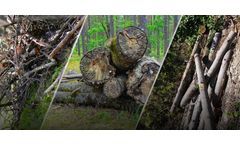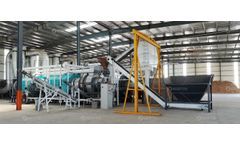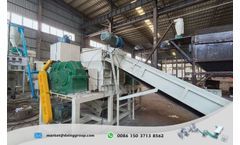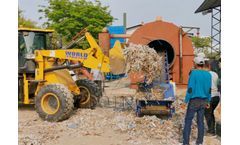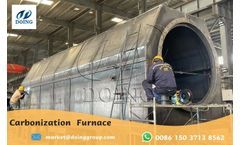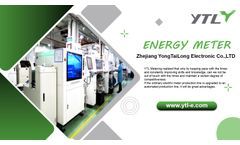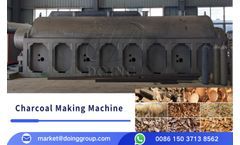Refine by
Energy Industry Articles & Analysis: Older
10,063 articles found
Critical considerations for anaerobic digestion projects In the field of industrial wastewater treatment, anaerobic digestion is a powerful process that transforms waste into valuable by-products. Most notably, it produces renewable energy in the form of biogas, which can be used to fuel operations, cogenerate electricity, or even be sold. Another valuable by-product of the process is digestate, ...
Charcoal production from forest waste represents an innovative approach to managing natural resources while addressing environmental and economic challenges. Through the integration of a charcoal making machine, this process offers a sustainable alternative to traditional practices, emphasizing resource efficiency and ecological preservation. Utilizing Forest Waste as a Resource Forest waste, ...
Branch in Bialystok, boiler K6, Poland In 2014-15, Radscan provided flue gas condensation and condensate purification to boiler K6 at ENEA’s CHP plant in Bialystok. The biofuel driven boiler has a capacity of 80MWh. Radscan’s plant delivers an up to an additional 25MWh and approx. 20m3/h treated condensate, which is used for district heating. The plant was acquired in February ...
High-purity copper (usually refers to a purity of 5N to 7N, i.e. 99.999% to 99.9999%) is a metal material with excellent physical and chemical properties. Properties of high-purity copper Electrical conductivity and thermal conductivity: High-purity copper has extremely high electrical conductivity and thermal conductivity, which makes it very useful in electronic and thermal management ...
Rice husk carbonization is an increasingly popular method for utilizing agricultural waste, offering significant economic benefits to both small-scale and large-scale producers. By converting rice husks into valuable biochar, the process not only provides an eco-friendly waste disposal solution but also opens up a range of commercial opportunities. The following explores the economic advantages ...
Photovoltaic panel recycling equipment uses specific technology to separate and recycle various valuable materials in waste photovoltaic panels, achieving both economic and environmental benefits, and is widely favored by investors and has become a popular investment project. When investors purchase related equipment, DOING photovoltaic panel recycling equipment has become the preferred choice of ...
The Indian photovoltaic industry has shown rapid growth in recent years. This rapid development has brought significant economic benefits, but also raised the issue of photovoltaic module waste management. It is estimated that by 2030, India may generate hundreds or thousands of tons of photovoltaic module waste. This data highlights the huge scale of India's photovoltaic industry and the waste ...
Pyrolysis is a thermal decomposition process that breaks down organic materials, such as plastic, rubber, and biomass, in the absence of oxygen. This process has gained significant attention for its potential in waste management and resource recovery, offering an effective way to convert waste into valuable products like fuel, gas, and biochar. A key question that often arises is whether ...
In modern buildings, with the emphasis on indoor air quality and energy efficiency, many governments have already introduced a series of policies and rules. In Europe, the EU's Green Deal emphasizes the dual goals of improving air quality and reducing building energy consumption. In the United States, the US Environmental Protection Agency (EPA) has promoted companies to monitor and improve ...
Cooling water circuits and solar systems are often filled with water-glycol mixtures for frost protection reasons. Propylene glycol added to the water mainly serves as frost protection. The propylene glycol also provides a certain degree of corrosion protection. Due to the addition of propylene glycol, the viscosity of the circulation fluid used increases slightly and the air separation capacity ...
In the production of biodiesel from rapeseed oil, it occurs that the crude oil as well as the final product gets into the waste water system. One such producer experienced problems with this situation, as the discharged wastewater had to comply with the regulations of the local communal wastewater treatment ...
Coolant is also frequently described as cooling lubricant or cutting fluid. Many manufacturing companies rely on coolant in their manufacturing processes. These coolants decrease the heat generated by friction in machining processes and also act as a lubricant between the workpiece and the tool. ...
For consulting engineers tasked with planning, designing and supervising construction projects, today’s zero-emission high-voltage electrode boilers offer advantages over traditional fossil-fuel burning models. Used for centralized heating, power plants, swing-load balancing and fuel boiler replacements, they can match the capacity (up to 65 MW) and output (270,000 lb of steam per hour) of ...
To recycle plastic to fuel oil using a pyrolysis vessel, follow these steps: 1. Preparation of Plastic Material: Collect and sort the plastic waste, ensuring it is free from contaminants that may interfere with the pyrolysis process. Common plastic types suitable for this process include polyethylene (PE), polypropylene (PP), and Polystyrene (PS) , ABS plastic, aluminum plastic, medical waste, ...
Biochar production is emerging as a transformative solution in agricultural management, particularly in addressing the environmental challenges associated with livestock farming. Through the use of advanced biochar making machines, farmers can mitigate emissions, improve soil quality, and unlock financial incentives, including tax relief. This article explores the connection between biochar ...
Charcoal is made by heating biomass waste such as wood and fruit shells in an oxygen-deficient or low-oxygen environment. This process is called carbonization. The carbonization process removes moisture, volatile substances and other impurities from the wood, leaving behind a substance that is almost pure carbon, namely charcoal. There are many materials available for making charcoal, which can ...
EMI test and EMS test are the core components of electromagnetic compatibility (EMC) test in the field of energy meter. These two tests are very important to ensure the stable operation and accurate measurement of energy meters in various electromagnetic environments. Below is a detailed description of the EMI and EMS testing of the energy meter. EMI test of energy meter 1. definition EMI testing ...
The integration of renewable energy sources into electricity generation poses major challenges for existing electricity networks because they were previously geared towards the operation of centralized large-scale producers. A promising way to increase the security of supply in decentralized power grids is to produce green hydrogen. Hereby, smoothing out peaks in supply and demand can be ...
The need for green hydrogen as a zero-emission fuel in industry is growing all the time. Energy supplier Gruyère Hydrogen Power SA (part of Gruyère Energie SA) from the Fribourg canton in western Switzerland has also recognized this potential and has therefore committed itself to the development and marketing of green ...
The biomass continuous carbonization furnace is an efficient and environmentally friendly equipment for the thermochemical conversion of biomass resources. The whole set of continuous carbonization furnace converts biomass into charcoal by controlling the temperature, pressure and gas of the carbonized material. The whole set of processing technology of the continuous carbonization furnace ...


